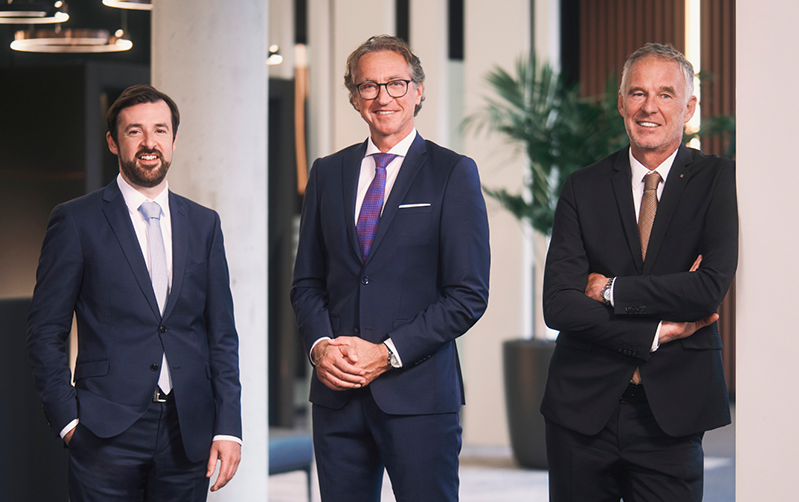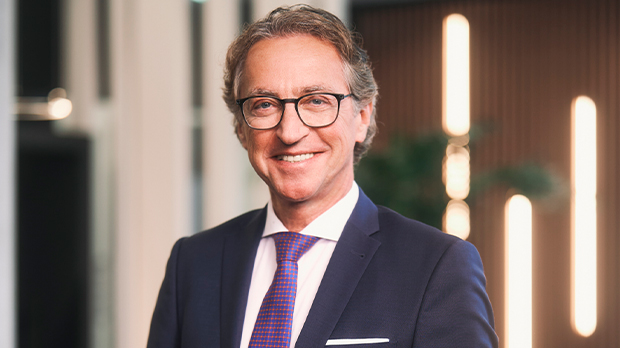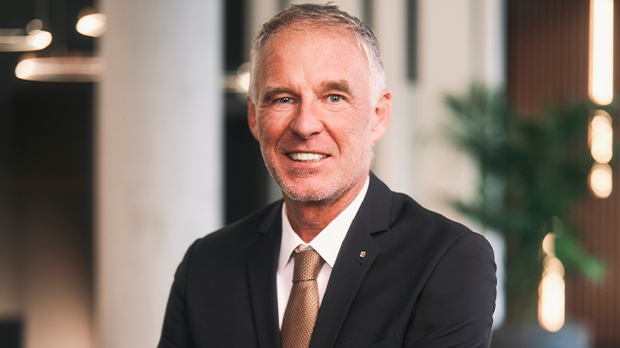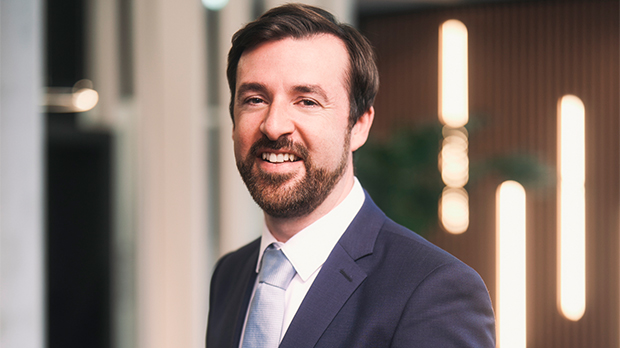Interview with the Management Board of Energie AG Oberösterreich

Management Board from left to right: Dipl.-Ing. Alexander Kirchner MBA, Member of the Management Board, Dr. Leonhard Schitter MA, Chair of the Management Board, Dr. Andreas Kolar, Member of the Management Board
Dipl.-Ing. Alexander Kirchner MBA Member of the Management Board CTO
Dr. Leonhard Schitter MA Chair of the Management Board CEO
Dr. Andreas Kolar Member of the Management Board CFO
Video statements of the members of the Management Board are available as part of the online version of the annual report: www.energieag.at/annualreport
How is Energie AG Oberösterreich meeting the challenges posed by global energy and climate policies in order to bolster its position as a pioneer of the energy transition? What progress has already been made with the LOOP strategy as part of our efforts to achieve climate neutrality?
Leonhard Schitter: The LOOP strategy is at the very heart of our transformation towards climate neutrality, pointing the way to the sustainable future of Energie AG Oberösterreich. Our aim with LOOP is to decarbonise the company’s entire energy cycle, from generation and distribution to utilisation. To do this, we are implementing targeted actions that satisfy both what is required by law and the ever-rising expectations of our customers.
In fiscal year 2023/2024, we made decisive progress: the amount of electricity generated from renewable sources, particularly hydroelectric power, was increased significantly. One of our flagship projects is the Ebensee pumped-storage power plant, which serves not only to reinforce security of supply but also as an important part in renewable energy storage strategies. We are also pressing ahead with decarbonisation efforts through projects such as the construction of Upper Austria’s largest agricultural PV plant in Pischelsdorf and our involvement in wind and PV developments in Slovenia.
One of our primary concerns here is also further enhancing our infrastructure to keep pace with the demands of the energy transition. By investing in the expansion and modernisation of our electricity grid, we are ensuring that decentralised sources of renewable energy are properly integrated and creating a solid basis for future technologies such as the use of hydrogen and e-mobility.
Another key focal area is innovation and digitalisation. With the introduction of a Group-wide innovation management system and the optimisation and automation of customer processes, such as by using Voicebot solutions to improve availability in customer service, we are increasing our efficiency and adapting to the challenges of a volatile energy market. All these actions are helping us achieve our climate goals, and underscore our position as a pioneer of the energy transition.
“The LOOP strategy is at the very heart of our transformation towards climate neutrality, pointing the way to the sustainable future of Energie AG Oberösterreich. To do this, we are implementing targeted actions that satisfy both what is required by law and the ever-rising expectations of our customers. Our innovative drive, digitalisation and corporate culture that promotes change and agility are the key to transforming today’s challenges into tomorrow’s opportunities for a sustainable future.”
How does Energie AG Oberösterreich ensure that the ambitious programme of investments in decarbonisation and grid expansion can be reconciled with having a solid financial base on a long-term basis?
Andreas Kolar: The much-needed transition towards the development of a sustainable energy system represents a drastic change that poses massive economic and technical challenges, particularly for energy suppliers. Significantly increasing the amount of energy generated from water, wind and the sun, as well as expanding the electricity grids as a whole, are key elements of Energie AG Oberösterreich’s strategic outlook.
There is also a focus on storage capacities. Work on building the pumped-storage power plant in Ebensee began in 2023, representing the largest single investment in the long history of Energie AG Oberösterreich.
The transformation process, which is already underway, will be the source of enormous costs in the coming years and decades. Energie AG Oberösterreich has also planned to substantially increase its investments in the next budget periods, particularly for sustainable energy generation and the expansion of the grid infrastructure required.
These ambitious investment programmes cannot be managed using the Group's internal financing power alone, instead requiring the involvement of national and international lenders and investors. For many years, Energie AG Oberösterreich has pursued a conservative and forward-looking financial strategy in order to be an attractive and stable long-term partner for its investors. This is conditional on Energie AG Oberösterreich ensuring the profitability and intrinsic value of the individual investment projects. It is to this end that Energie AG carries out extensive project evaluations and risk analyses that consider financial, technical and environmental risks.
From a Group perspective, the ability to take on debt is planned and continuously analysed as part of the long-term budget. In addition to ensuring structural liquidity, particular attention is paid to safeguarding long-term financial stability and creditworthiness. This has also been recognised by the external rating agency ‘Standard & Poor’s’ Global Ratings, which has been giving the Group a strong investment grade rating for many years.
Stable economic results, the possibility of reinvesting profits for future investments and the upholding of a sound financial structure are essential for funding the investments needed to support the energy transition.
“The European Taxonomy Regulation sets requirements for the reduction of CO2 emissions and the promotion of renewable energies, stipulating which economic activities make a significant contribution to one of the defined environmental objectives, while also calling on companies to align their investments and business strategies accordingly. Energie AG Oberösterreich has been grappling with this issue now for two years with its LOOP strategy. It is Energie AG’s strategic goal to reduce its carbon footprint and to make its energy production more sustainable.”
In your view, which technological developments are crucial to driving the energy transition forward, and how is Energie AG Oberösterreich ensuring that these are optimally integrated into existing structures?
Alexander Kirchner: Key technological developments for the energy transition include the expansion of renewable energies such as wind, solar and hydroelectric power, the further development of hydrogen technologies and the implementation of innovative storage solutions. Hydrogen is considered a versatile energy source of the future, particularly when it comes to the decarbonisation of industrial processes and for flexible applications in the energy system. By the same token, technologies for the efficient use and storage of renewable energies play a key role in compensating for fluctuations in energy production and ensuring a stable supply. The construction of the Ebensee pumped-storage power plant is an outstanding example and flagship project of Energie AG Oberösterreich. This modern power plant acts as a ‘green battery’ that feeds renewable energy into the grid when needed, thereby providing stability for the electricity grid.
Energie AG Oberösterreich is pursuing a gradual and considered integration of these technologies into existing infrastructures, being driven by targeted investments in the modernisation of networks, the development of intelligent systems such as smart grids, and collaboration with research institutions and innovative partners from industry. One particularly pioneering project is Underground Sun Storage, a collaboration with RAG Austria AG to trial the production and storage of green hydrogen. Not only do such pilot projects and testing grounds enable the practical implementation of innovative technologies, but they also provide valuable insights for their widespread application.
“Energie AG Oberösterreich is actively shaping a net-zero future as a reliable partner for industry, businesses and households. By expanding production, grids and storage, we are driving the energy transition forward and gradually accelerating the pace of decarbonisation of our existing plants. In doing so, we rely on innovation and cooperation to ensure a sustainable supply of energy. As a decarbonisation partner, we create solutions for our customers that have an impact far beyond our region and will shape the energy future for generations to come.”
How do the European taxonomy requirements influence the investment plans of Energie AG?
Andreas Kolar: The provisions of the Taxonomy Regulation provide clear guidance for sustainable investment and create financial incentives. For companies, this means that investments in line with the EU taxonomy will be considered sustainable and environmentally friendly. This has an influence on both decisions about future projects, and also the way investors and stakeholders evaluate projects.
The Taxonomy Regulation sets requirements for the reduction of CO2 emissions and the promotion of renewable energies, stipulating which economic activities make a significant contribution to one of the six defined environmental objectives, while also calling on companies to align their investments and business strategies accordingly.
Energie AG Oberösterreich has been grappling with this issue now for two years with its LOOP strategy. Environmental and climate mitigation aspects are increasingly being taken into account when selecting and prioritising projects, in addition to economic factors. It is Energie AG’s strategic goal to reduce its carbon footprint and to make its energy production more sustainable.
Preference is also given to investments in sustainable infrastructure that meet the criteria of the taxonomy. This includes the modernisation of electricity grids to integrate renewable energies and the development of new technologies, such as hydrogen production or large battery storage systems.
Transparent communication plays a crucial role in promoting trust in sustainable financial markets and ensuring that investors, companies and stakeholders properly understand the environmental and sustainability performance of companies and projects. However, the extensive disclosure and reporting requirements in this regard also result in increased bureaucracy and detailed documentation requirements for companies.
In short, it can be said that the European taxonomy requirements provide a clear and structured basis for prioritising investment projects at Energie AG. They promote sustainable investments and support the communication of the sustainability of corporate activities in a transparent and comprehensible manner.
Talking about integrating new technologies: What role do digital transformation and sector coupling play in optimising energy supply and further expanding the use of renewable energies?
Alexander Kirchner: The digital transformation and sector coupling are core elements required to optimise the supply of energy and to integrate renewable energies on a sustainable basis. Digital technologies such as big data, artificial intelligence (AI) and automated systems make it possible to analyse and control complex energy systems with precision. These technologies improve the efficiency of the grid infrastructure, optimise the operation of renewable energies and create intelligent solutions for energy consumers. An important step here is the increasing roll-out of smart meters, which have been available in Upper Austria since 2020 and are already installed in 99.8 per cent of customer systems. These meters enable our customers to record and analyse consumption data in real time, so that they can achieve a better balance between energy generation and use.
Sector coupling combines the electricity, heating and mobility sectors into an integrated energy system, enabling renewable energies to be used more effectively and flexibly across a range of applications. One example of the successful implementation of this strategy is the thermal waste incineration plant in Wels, which plays a key role in the supplying of heat and energy to the city of Wels and contributes significantly to the decarbonisation of the urban supply. Energie AG Oberösterreich is also spearheading innovative solutions with projects such as the agricultural photovoltaic plant in Pischelsdorf, which open up agricultural land for sustainable energy production and further promote its expansion. The aim is to create a holistic, sustainable supply of energy supply that is not only efficient but also offers a high level of security of supply and contributes to decarbonisation in the long term.
How does Energie AG Oberösterreich use its corporate culture and targeted initiatives to promote a sustainable willingness to change and employee loyalty, in order to be perceived as an attractive employer in the long term?
Leonhard Schitter: Our corporate culture is key to actively shaping change and taking our employees with us on this journey. We are setting clear priorities with our ‘cultural compass’ to create an open and participative working environment that not only enables change, but actively promotes it. One important focus is on the topic of agility: we have trained agile coaches internally to establish a flexible and future-oriented way of working in all areas.
Having a good balance between work and family life is also a key issue for Energie AG. Flexible working time models, the opportunity to work from home and targeted support services ensure that the individual needs of our employees are considered. At the same time, we encourage both personal and professional development through further training opportunities and a comprehensive company health management programme.
In addition, initiatives such as our innovation board create space for cross-departmental exchange and idea generation, which strengthens the innovative power of our organisation. These targeted measures both promote employee satisfaction and loyalty, and also make Energie AG Oberösterreich an attractive employer in the long term, one that is actively shaping the challenges of the energy transition. After all, our employees are not only an integral part of our strategy, but also our most important success factor on the road to a sustainable future.




